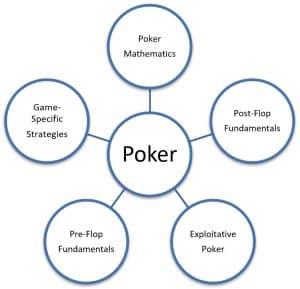In the world of poker, where strategies and mind games reign supreme, one aspect often gets overlooked – math. Many players underestimate the role that mathematics plays in poker, considering it as a secondary skill compared to reading opponents and making strategic moves. However, in this blog post, we’ll delve into the significance of math in poker and explore how it has evolved to become a driving force in modern gameplay.
The Evolution of Poker
To understand the importance of math in poker, it’s essential to consider the evolution of the game itself. Decades ago, poker relied heavily on street smarts, intuition, and reading opponents. Players like Doyle Brunson honed their skills through intuition and outplaying opponents. However, as the years went by, the landscape of poker underwent a significant change.
Modern Poker: Entrenched in Math and Game Theory
In recent years, poker has become a game deeply intertwined with game theory and mathematics. Especially in higher-stakes games, professional players leverage mathematical analysis to gain an edge over their opponents. The basics of poker math, once considered difficult, are now accessible to players at all skill levels, providing opportunities to improve and outplay adversaries.
Exploring Successful Pros
To truly appreciate the impact of math on poker, let’s explore the strategies of three successful poker professionals: Doyle Brunson, Liv Boeree, and Daniel Negreanu. Each player represents a different era and approach to the game, highlighting the influence of math on their playing style.
Doyle Brunson: Pioneering Instinctual Play
 Doyle Brunson, widely regarded as one of the greatest poker players of all time, left an indelible mark on the game. Sadly, Doyle Brunson passed away, but his contributions to the world of poker remain legendary. Coming from an era where street smarts and intuition were key, Brunson’s success was built on his exceptional ability to read opponents and exploit weaknesses. While his style of play may be considered incomplete in today’s highly competitive poker landscape, his contributions continue to shape the game, even after his recent passing, leaving an enduring legacy in the hearts of poker enthusiasts.
Doyle Brunson, widely regarded as one of the greatest poker players of all time, left an indelible mark on the game. Sadly, Doyle Brunson passed away, but his contributions to the world of poker remain legendary. Coming from an era where street smarts and intuition were key, Brunson’s success was built on his exceptional ability to read opponents and exploit weaknesses. While his style of play may be considered incomplete in today’s highly competitive poker landscape, his contributions continue to shape the game, even after his recent passing, leaving an enduring legacy in the hearts of poker enthusiasts.
Liv Boeree: The Mathematical Mind
 Liv Boeree, a former professional poker player, epitomizes the immense impact that embracing math can have on one’s success. With a degree in astrophysics, Boeree combined her scientific background with a deep understanding of game theory and mathematics to excel in poker. Unlike Brunson’s approach of exploiting opponents, Boeree’s game revolved around analytical decision-making, relying on mathematical analysis and a practical application of game theory. Her success, with career live earnings of approximately $3.8 million, shows the power of math in modern poker and the impact of a scientific approach to the game.
Liv Boeree, a former professional poker player, epitomizes the immense impact that embracing math can have on one’s success. With a degree in astrophysics, Boeree combined her scientific background with a deep understanding of game theory and mathematics to excel in poker. Unlike Brunson’s approach of exploiting opponents, Boeree’s game revolved around analytical decision-making, relying on mathematical analysis and a practical application of game theory. Her success, with career live earnings of approximately $3.8 million, shows the power of math in modern poker and the impact of a scientific approach to the game.
Daniel Negreanu: Adapting with the Game
 Daniel Negreanu, one of the most recognized and successful players in poker, has witnessed firsthand the impact of the internet and online poker on the game’s evolution. Online poker forced him to reevaluate his strategy and delve into the world of mathematics and statistical analysis to stay ahead of the younger, math-savvy generation of players. Recognizing the contemporary landscape of the game, Negreanu relearned and embraced poker math to fortify his arsenal. This dedication allowed him to revitalize his game and remain at the forefront of the poker world. Negreanu’s success demonstrates the importance of adapting and embracing math to thrive in the ever-changing poker landscape.
Daniel Negreanu, one of the most recognized and successful players in poker, has witnessed firsthand the impact of the internet and online poker on the game’s evolution. Online poker forced him to reevaluate his strategy and delve into the world of mathematics and statistical analysis to stay ahead of the younger, math-savvy generation of players. Recognizing the contemporary landscape of the game, Negreanu relearned and embraced poker math to fortify his arsenal. This dedication allowed him to revitalize his game and remain at the forefront of the poker world. Negreanu’s success demonstrates the importance of adapting and embracing math to thrive in the ever-changing poker landscape.
The Driving Force: Online Poker and Software Tools
 The proliferation of online poker and the advent of various software tools have played a pivotal role in poker’s evolution and the increased emphasis on mathematics. These tools provide players with invaluable statistical insights, enabling them to analyze and optimize their gameplay. From artificial intelligence-based software training to equity and range analysis tools, poker players now have access to an array of resources that enhance their understanding of the game’s mathematical aspects.
The proliferation of online poker and the advent of various software tools have played a pivotal role in poker’s evolution and the increased emphasis on mathematics. These tools provide players with invaluable statistical insights, enabling them to analyze and optimize their gameplay. From artificial intelligence-based software training to equity and range analysis tools, poker players now have access to an array of resources that enhance their understanding of the game’s mathematical aspects.
The Primary Aspects of Poker
While math is an integral component of overall poker strategy, it intersects with four other essential aspects of the game. These aspects include playing the player (exploitative poker), fundamental pre-flop concepts and strategies, fundamental post-flop concepts and strategies, and game-specific strategies. Understanding the mathematical principles underlying these areas of poker enhances a player’s overall skill set and decision-making ability.

Fundamental poker mathematics underpins all aspects of the game. For example, pre-flop and post-flop strategies are influenced by mathematical concepts, including equity calculations in decision-making processes. Exploitative play involves identifying mathematical leaks in opponents’ games and capitalizing on them. By embracing the role of mathematics across these aspects, players can develop a well-rounded understanding of the game, optimize their decision-making processes, and gain a significant competitive edge. Poker mathematics provides a strategic framework for making informed choices, increasing profitability, and achieving long-term success at the poker table.
Conclusion
The importance of math in poker cannot be overstated. As the game has evolved, mathematics and game theory have become essential components of a successful player’s toolkit. By incorporating mathematical analysis into their strategies, players can gain a competitive advantage and elevate their game to new heights. Whether playing in live games or online, understanding the importance of math in poker is the key to staying ahead of the competition.
Add Your Heading Text Here
How useful was this post?
Click on a star to rate it!
Average rating 4.3 / 5. Vote count: 3
No votes so far! Be the first to rate this post.
